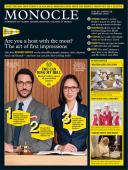
Issue 90
Are you a host with the most? The art of first impressions. Our first Reader Survey on the friendliest people, nations, cities, airports, hotels and brands – and how you can join their smiling ranks.
In This Issue
Oops! No content was found.
Looks like we no longer have content for the page you're on. Perhaps try a search?
Return Home

